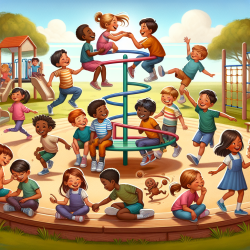Introduction
Recess is a vital component of the school day, offering children a break from structured learning and an opportunity for physical activity and social interaction. Recent research, such as the study titled “And I still remember it to this day”: A qualitative exploration of retrospective memories of school-based recess, highlights the long-term impact of recess experiences on adult health behaviors and social well-being. This blog explores how educators and practitioners can leverage these findings to improve recess experiences and outcomes for children.
The Impact of Recess Memories
The study examined adults' worst recess memories and their association with current physical and social health. Common negative memories included experiences of isolation, physical injuries, victimization, and contextual factors like weather. Notably, individuals who recalled isolating experiences during recess reported higher levels of social isolation in adulthood. This finding underscores the lasting impact of social experiences during childhood on adult mental health.
Practical Implications for Practitioners
For practitioners working with children, these findings highlight the importance of creating positive recess environments. Here are some strategies to consider:
- Promote Inclusivity: Encourage cooperative games that foster inclusiveness and teamwork among peers. This can help reduce feelings of isolation and exclusion.
- Train Supervisors: Equip recess supervisors with the skills to model positive interpersonal relationships and intervene effectively in cases of bullying or harassment.
- Design Inclusive Playgrounds: Ensure playgrounds are accessible to children of all abilities, promoting equal participation and reducing barriers to play.
Encouraging Risky Play
The study also found that participants who recalled physical injuries during recess had higher self-efficacy for physical activity. This suggests that engaging in risky play, which involves challenges and boundary testing, can foster resilience and self-confidence. Practitioners should balance safety with opportunities for children to engage in challenging play, which can enhance their physical and emotional development.
Conclusion
Recess is more than just a break from academics; it is a crucial period for children's development. By understanding the long-term impact of recess experiences, practitioners can create environments that support positive social interactions and encourage healthy physical activity. This not only benefits children's immediate well-being but also sets the foundation for their future health and social success.
To read the original research paper, please follow this link: “And I still remember it to this day”: A qualitative exploration of retrospective memories of school-based recess.










